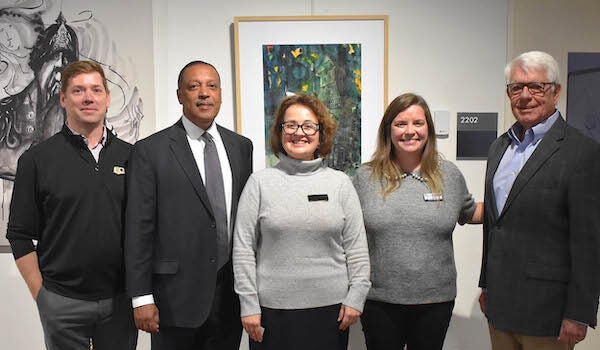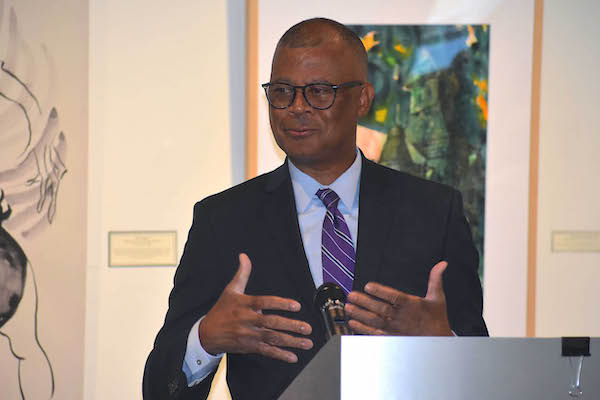ECU celebrates graduates of Rural Community Capacity program
On Nov. 21, East Carolina University graduated its first participants from the Rural Community Capacity (RC2) program, a statewide initiative focused on building stronger, more competitive and more prosperous rural communities.
The program, led by the North Carolina Department of Commerce’s Rural Economic Development Division (REDD), provides targeted professional development for local government leaders in some of North Carolina’s most economically distressed areas. The RC2 curriculum covered six key areas of community development and engagement, including strategic planning, grant writing, emergency management, economic development, asset mapping and affordable housing.
ECU partnered with commerce to offer the training on campus and to provide an eastern location for the statewide program.
“ECU has a rich history of campus engagement and investments in regional community and economic development initiatives. Our RC2 partnership with ECU’s Master of Public Administration program is a perfect alignment that leverages the resources and expertise of the University and REDD together in support of our rural local governments,” said Kenny Flowers, assistant secretary for REDD.

ECU faculty and staff who led the RC2 training were (pictured from left to right) Dr. Jason Pudlo, Merrill Flood, Dr. Olga Smirnova, Dr. Emily Yeager, and Charles Hayes.
ECU’s faculty and professional experts in community development, planning and public policy guided the program. The faculty and staff who led the sessions included Merrill Flood, director of research and innovation campus development and planner-in-residence; Charles Hayes, senior fellow-in-residence; Dr. Jason Pudlo, assistant professor of political science; Dr. Olga Smirnova, professor of political science; and Dr. Emily Yeager, assistant professor of recreation sciences and director of the Crisp Small Business Resource Center.

RC2 program participants gather at Joyner Library to celebrate the first ECU cohort graduation.
Flood said the training offered participants an immersive learning experience with direct, hands-on technical assistance to address the unique challenges faced by rural communities.
“This program provided an applied based collaborative approach to strengthening the capacity of rural communities across eastern North Carolina,” said Flood. “By introducing practical tools, proven strategies and best practices, we were able to directly address the unique challenges these communities face. The program also connected them with critical resources that will help further tackle their most pressing issues.”
Participants found the training highly beneficial, providing them with direction to effectively address their communities’ needs.
“This program is valuable for local leaders and elected officials alike. It provides a better understanding of what is needed to move communities forward and increase the resiliency, economic and social well-being of our citizens. I would encourage other community leaders to consider the program so that more areas of our state could benefit,” said Beth Bucksot, economic development director for Pamlico County.
As part of the program, the Southeast Crescent Regional Commission and N.C. Commerce offered each community the opportunity to develop and submit a grant proposal addressing a specific challenge in their area. After completing the training and submitting their applications, each participating community received a $45,000 grant to support their project. These grants are intended to help communities put the strategies and solutions they developed during the program into action.
ECU faculty and staff are confident that the RC2 program will have a lasting impact on the participating communities, helping them make meaningful strides toward transforming their regions.
“The RC2 program underscores the impact of regional partnerships and the mission of ECU, N.C. Commerce and local leaders in strengthening the economic vitality and resilience of rural North Carolina,” said Smirnova. “We look forward to seeing how the insights and skills developed through this initiative will fuel long-term, sustainable growth in these communities.”
Representatives from nine rural communities participated in the six-week program, each seeking to build capacity in key areas of community development. Those taking part in ECU’s inaugural cohort were:
- Town of East Arcadia – Ronetta Butts and Veronica Moore
- Central Pines Council of Governments – Tyler Queen
- Greene County – Trey Cash and Brock Kearney
- Town of Manteo – Josh Houston
- Pamlico County – Mark Brewington, Tim Buck and Beth Bucksot
- Pitt County – Kelly Andrews and Devin Johnson
- Town of Princeton – Mike King
- City of Roanoke Rapids – Kristyn Anderson and Anthony Price
- Town of Vandemere – Sandra Snipes and Stacie Tindle

The North Carolina Department of Commerce’s Rural Economic Development Division assistant secretary, Kenny Flowers, addresses RC2 participants.